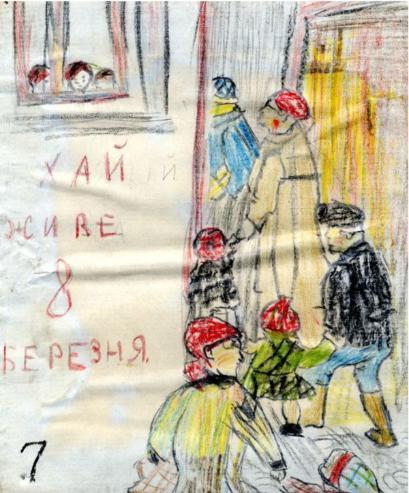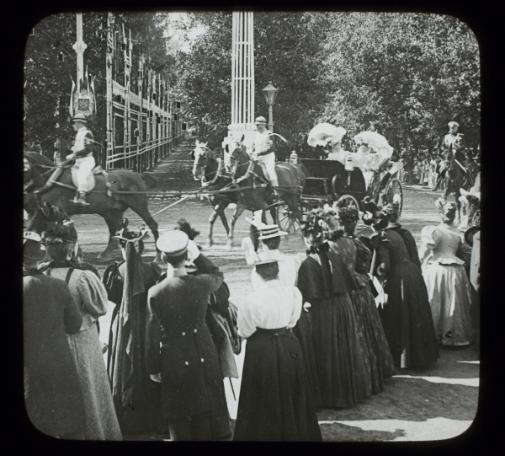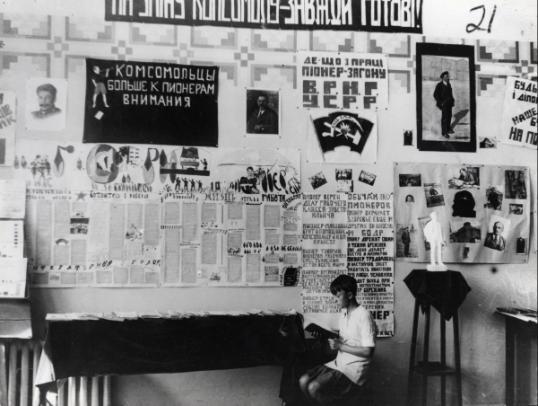Today In History: Riots and Strikes in Petrograd

Amid widespread government corruption; dissolution of the Russian parliament (Duma); backwards economy; and suffering people, imperial Russia was defeated by Germany in the First World War (1914-1918). The country saw an estimated total of 1,811,000 total military and 1,500,00 civilian deaths.
The Romanov Family had ruled for 304 years, from 1613-1917. With lack of faith in the tsar regime and its ability to deal with growing challenges at home and abroad, angry Russian citizens began rioting and striking in the streets of Petrograd (now St Peterburg) on March 8th, 1917 over food scarcity and other deplorable living conditions. Thousands of workers protested, industry shut down, and clashes with police occurred, as people struggled for bread to feed their families. Russia's "February Revolution" (named accordingly under the Julian Calendar), led swiftly to the abdication of Nicholas the II (Nikolai II Alexandrovich Romanov), the last tsar who served from November 1st, 1894 as Emperor of Russia, King of Congress Poland, and Grand Duke of Finland.
Bolshevism, a growing political movement, was led by Vladimir Lenin, a leftist revolutionary who seized control. The Bolsheviks executed by gun and bayonet the former Emporer, and his immediate family -- Tsarina Alexandra Feodorovna; their daughters, the Grand Duchesses Olga, Tatiana, Maria, and Anastasia; and young hemophilliac son, Duke Alexei -- as well as the imperial entourage, on July 16-17, 1918. They were held in a locked basement of a house in Yekaterinburg, near the Ural Mountains, under pretense of safe passage to Siberia.
After the revolution, Russia exited World War I by signing a peace treaty with Germany, known as the Treaty of Brest-Litovsk. The Bolsheviks became the Communist Party of the Soviet Union, with Lenin as head of government until his death in 1924. The remains of the Romanov family; court physician Eugene Botkin; lady-in-waiting Anna Demidova; footman Alexei Trupp; and head cook Ivan Kharitonov, would not be acknowledged by the Soviet Union until 1989 during glasnost, a practice initiated by leader Mikhail Gorbachev for more open consultative government and wider dissemination of information.
The following articles are drawn from Proquest Historical Newspapers, which informs and inspires classroom teaching and learning.
- Czar Abdicates and Revolutionists Hold Complete Control Of Russian Government: Pro-Teutons Captured and "Push the War" Party Completely In Power. (1917, Mar 16). San Francisco Chronicle (1869-1922)
- Entry Of U. S. Into World War Greatest Development Of 1917: Russian Revolution, Resulting In Overthrow Of Czar Nicholas, Chief Among Political Uphealvals: Review Of Twelve-Month Period Drawing To Close Tale Of Death and Destuction On Land and Sea: Year Is Marked By Many Oustanding Events. (1917, Dec 30). Courier-Journal (1869-1922)
- Forced Army Service Stirs Toilers To War: New Faction Turns Out In Revolution and Attacks Troops In Street: Rebel Chief Victorius: Moscow-Petrograd Railway Reported Under Shelling From Fortress. (1921, Mar 09). San Francisco Chronicle (1869-1922)
- Florinsky, M.T. (1935, Jun 02). The Heroic and Tragic Drama Of Russia's Revolution: Mr. Chamberlin's Monumental History Spans the Years From 1917 to 1921. New York Times (1923-)
- Wendt, L. (1941, Jul 13). Russia's Bloody Road To Dictatorship: The Fall Of the Czars and Rise Of the Reds: The Purge Paves the Way For Ruthless Stalin. Chicago Daily Tribune (1923-1963)
- Grover, P. (1964, Aug 16). Russia's Collapse: Part VI: Bolsheviks Grabbed Power; Lenin's Star Rises. The Hartford Courant (1923-)
- Crankshaw, E. (1967, Feb 19). Fifty Years Ago: The Coup That Changed the World. New York Times (1923-)
- Grose, P. (1967, Mar 13). Half a Century Ago: Liberals In Parliament Pressed For Moderation Of Czar's Rule. New York Times (1923-)
- Chronology Of the Revolution: 1917. (1967, Oct 22). Boston Globe (1960-)
- Harris, H. (1977, Dec 01). The Death Of the Czar's Army -- 2. The Irish Times (1921-)

Tips:
- Hasegawa, Tsuyoshi. The February Revolution, Petrograd, 1917: The End of the Tsarist Regime and the Birth of Dual Power. Vol. 149. Boston: Brill, 2017. e-book
- Mandel, David. The Petrograd Workers in the Russian Revolution : February 1917-June 1918. Leiden: Brill, 2017. e-book
- Rauchensteiner, Manfried, et al. The First World War and the End of the Habsburg Monarchy, 1914-1918. Trans. Alex J. Kay, Anna Güttel-Bellert, and Anna Gèuttel-Bellert. 1st ed. Wien, Austria: Böhlau, 2014. e-book

Images:
- Long Live, March the 8th, (Khai Zhive 8 Bereznya), by Unknown, from the Ukrainian Children's Art Collection, Courtesy of Teachers College, Columbia University
- Empresses of Russia and Germany, Driving, Peterhof, from the Rothman Lantern Slide Collection, Courtesy of Teachers College, Columbia University
- In Lenin's Corner, from the Ukrainian Education Photograph Collection, Courtesy of Teachers College, Columbia University
Need to keep current, look to the past, teach a topic? The Everett Cafe features daily postings of news from around the world, and also promotes awareness of historical events from an educational context. Be sure to check additional Cafe News postings on the library blog.

